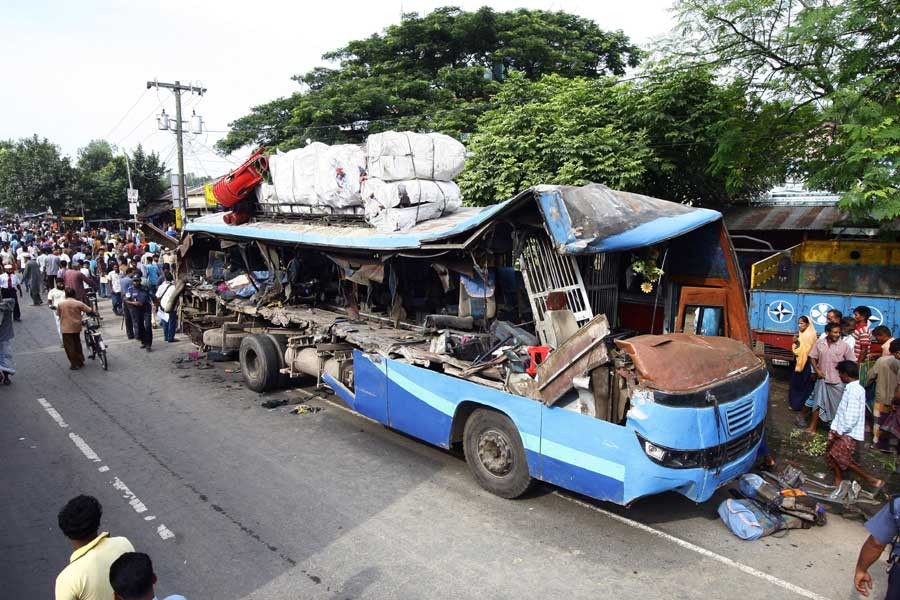
Published :
Updated :

The Road Transport Bill, 2018, the draft of which was approved by the government a couple of months ago, will be placed in parliament in its next session, which is scheduled to begin on September 10. If passed into law, it will replace the existing Motor Vehicles Ordinance, 1983.
The draft Road Transport Act 2018 stipulates a maximum penalty of five years in jail and a Tk 500,000 fine for fatal road accidents. The government hurriedly passed the draft law following the nationwide student protest that took off on July 29 following a road accident where two college students were killed by a speeding bus.
There was, however, an unprecedented demand for the provision of capital punishment in the new law, but the cabinet approved the recommended five-year imprisonment and Tk 0.5 million fine as maximum penalty. It may be mentioned that if a driver is found to have voluntarily killed someone in a road accident, he or she may be sentenced to death under the Penal Code's Section 302.
When the draft law was being formulated, it was proposed that the maximum punishment be raised to seven years in jail, but it fell through due to vehement protest by transport owners and workers. Although it does not include death penalty, the government says, the proposed new law includes stricter punishments than the existing one for violation of different traffic rules. It also proposes some administrative changes and includes new criteria for vehicles, penalties and other issues.
Nevertheless, we have seen unprecedented and spontaneous movement by the school and college students demanding concrete government steps to improve road safety measures following the deaths of the two students. They came under attack by the police and alleged ruling party activists on many occasions. The protests continued for a couple of months.
The government claimed some vested quarters tried to capitalise on the student protests and create unrest by spreading rumours. In the end, however, it is the students who are paying the price.
Accidents, in fact, occur frequently not on isolated road stretches, but in crowded intersections and bus stands, which are poorly planned or poorly regulated. Road curves with poor visibility are also responsible for a large share of the accidents. Seventy-six per cent accident victims come from the vulnerable road users.
Indiscipline on the part of drivers, blatant disregard for road traffic rules, over-speeding, fatigue driving and poor conditions of roads are the root causes of most of the accidents. Poor driving standards, caused by low educational level of drivers and lack of formalised education, are also to blame for the severe impact on road safety problems.
People cross busy roads ignoring the running vehicles. It is now a common phenomenon. This puts many liabilities on both the people and the drivers. In most cases the drivers are helpless. Instead of using the foot over-bridge, people jaywalk across busy roads just to save a few minutes.
As soon as the signal turns green, drivers hasten to drive their cars while people are also in a hurry to cross the roads. Accidents do frequently occur at such times.
Throughout the city, most of the over-bridges remain otherwise unused and people frequently use roads to get across. That is why road accidents are so frequent.
The city is becoming more and more crowded and most of the footpaths are being occupied by people hanging out on the streets or by the roadside vendors. People have not yet become accustomed to using the foot over-bridges. They often jaywalk, sometimes while talking on their mobile phones, which is very dangerous and is a prime cause for the frequent accidents.
The moot point is that the foot over-bridges must be cleared of all vendors. Many say the foot over-bridges are too high to climb. The authorities, as such, need to improve the design of over-bridges to encourage people to use them.
Most worrisome aspect is that there appears to be a lack of accountability everywhere. The drivers seem to believe they can get away with road traffic fatalities. On the other hand, the law enforcers hardly show urgency in enforcing rules and regulations to penalise the violators.
In order to reduce the number of such road accidents, an effective and comprehensive system of accountability needs to be put in place whereby not only the reckless drivers will be made to face the music for their actions but also will the law enforcers be made accountable for their inactions.


 For all latest news, follow The Financial Express Google News channel.
For all latest news, follow The Financial Express Google News channel.